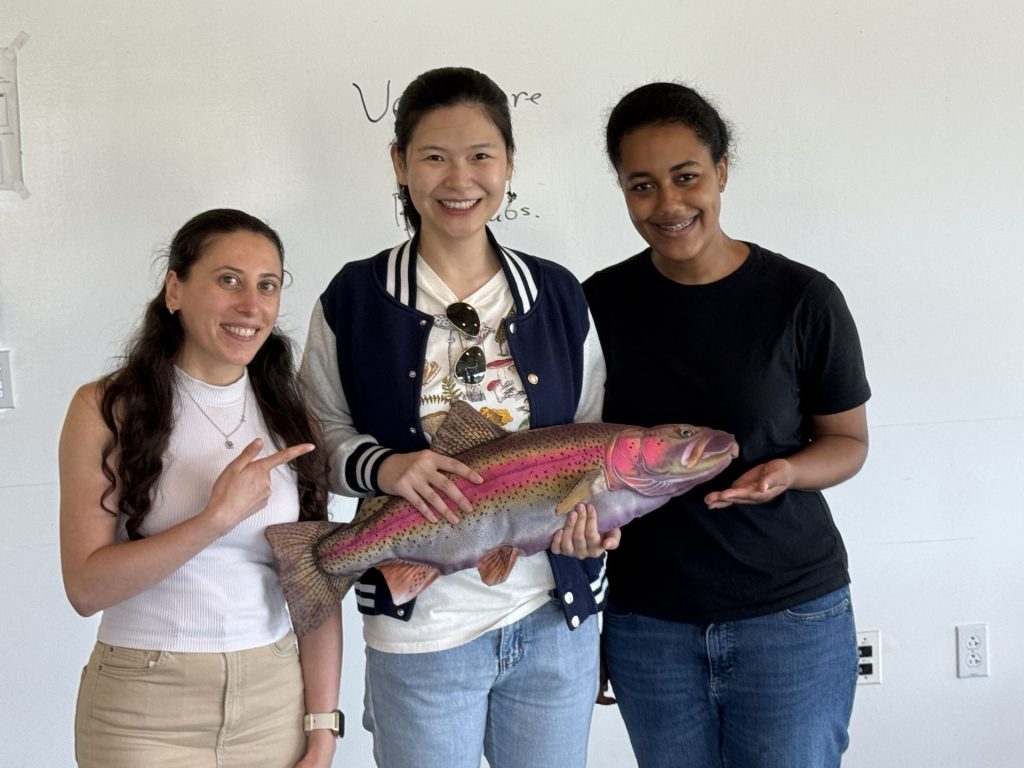Kenta Kakenami has been awarded a three-year fellowship by the Japan Student Services Organization. Congratulations Kenta!!


Kenta Kakenami has been awarded a three-year fellowship by the Japan Student Services Organization. Congratulations Kenta!!

Carla Spellerberg made a presentation with Carolin Reinert of joint work at the Semantics Colloquium in Institut für Linguistik Goethe-Universität Frankfurt. The title of their talk was “Understanding non-default readings of adjective noun constructions”.
The Proceedings of the 31st Annual Meeting of the Austronesian Formal Linguistics Association (Vol. 31 (2025)) have been officially published! The proceedings were edited by graduate student Alessa Farinella and former postdoc Pizarro-Guevara and include contributions from the AFLA 31 meeting hosted by our department in June 2024. Thanks to Ileana Paul at Western University for hosting the proceedings and shepherding through the implementation of a new hosting platform and website for the AFLA proceedings!
The proceedings contains contributions from graduate students Yi-Shih Helen Chen (Existential verb heza and the non-classical existential constructions in Takbanuaz Bunun) and Roger Cheng-yen Liu (Intonational elements and alignment in Bunun dialects).
Jia Ren made a presentation titled “Interpreting Plural Predication in Visual Contexts: Cover-Based Resolution of NP Structure” at XPRAG 2025. This is joint work with Hening Wang and Michael Franke.

Faruk Akkuş has taught at the Summer School on the Syntax of Copular Sentences in Semitic Languages held on September 8-12, 2025 at the University of Nantes. The summer school involved both general and language-specific courses on copulas, as well as fieldwork sessions led by the instructors in the afternoons. More information can be found on the summer school website.
Relatedly, there will be a conference called “The Syntax of Nominal Copular Clauses: Cross-linguistic description and formal theories (SyNCC)” on 23-24 September 2026 at Bielefeld University, Germany. The deadline for CfP is 30th April 2026.
Joe Pater has been named a PIT Faculty Fellow for this academic year. He will work with an interdisciplinary group in developing their research projects in Responsible AI, and also engaging in discussion on that theme, including helping to organize events that will engage the broader campus community. This Fellowship will support his collaborative work on a system for automatic IPA transcription with Center for Data Science and AI research fellow Virginia Partridge.
Our Department was represented at the recent conference “Rencontres du Réseau Français de Phonologie” (Agadir, Morocco July 1-3). Ali Nirheche presented his paper “Using temporal stability to probe the syllabification of medial geminates” and Ali and Michael Becker presented their paper “Prosodic augmentation in the Moroccan Arabic broken plural”

Welcome to Utku Turk, who is visiting the department this semester from the University of Maryland.
“I am a PhD candidate in UMD. I am mainly working on processing and production of number, morphosyntax of case marking and suppletion, and semantics of questions and alternatives. I nerd about statistics and task effects. I have a list of best ice creams around the world and I would like to go around and take amateur photos with my camera.”
Yixiao Song, linguist and computer scientist, defended her PhD dissertation on on August 25. The title of her thesis is “Advancing AI Factuality via Comprehensive Evaluation”. The committee consisted of Mohit Iyyer and Rajesh Bhatt (advisors), Scott Yih, Negin Rahimi and Brendan O’Connor.
Yixiao begain her studies at UMass in the Linguistics Department and has an honorary picture with the fish. Big congratulations Yixiao!!




Congratulations to graduate students Özge Bakay and Alessa Farinella on being awarded Doctoral Dissertation Research Grants from the National Science Foundation Linguistics Program! Bakay’s grant (NSF Award 2518020, $13,755.00) is entitled Doctoral Dissertation Research: Hierarchical relations in real-time sentence comprehension (PI: Faruk Akkuş, co-PI: Özge Bakay). Farinella’s grant (NSF Award 2314322, $13,476.00) is entitled Doctoral Dissertation Research: Investigating the role of prosody on word order (PI: Kristine Yu, co-PIs: Alessa Farinella, Kyle Johnson).